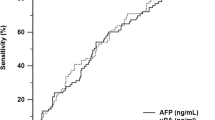Abstract
Objective: To study the changes of tissue-type plasminogen activator (t-PA), urokinase-type plasminogen activator (u-PA) expressions and fibrinolysis molecular markers in patients with gastrointestinal cancer in order to elucidate their clinical significance. Methods: The plasma levels of t-PA, u-PA, urokinase-type plasminogen activator receptor (u-PAR) and plasmin anti-plasmin complex (PAP) were measured by ELISA. t-PA and u-PA mRNAs were detected by Real-time RT-PCR. Results: The plasma levels of u-PA, u-PAR and PAP were elevated in gastrointestinal cancer patients, while u-PA was markedly elevated in patients with local infiltration, lymph node involvement or distal metastasis. U-PA mRNA was higher and t-PA was lower in gastrointestinal cancer compared to normal tissue. Conclusion: Hyperfibrinolysis is an important factor related with metastasis potential of gastrointestinal cancer. t-PA may be a character of well differentiated tissue.
Similar content being viewed by others
Reference
Marek Z, Wojtukiewicz, Ewa S, et al. Tissue factor dependent coagulation activation and impaired fibrinolysis in situ in gastric cancer[J]. Semin Thromb Hemost 2003; 29: 291–9.
Wenyi Q, Weizhu Z, Colette W, et al. Association of u-PA, PAI-1 and u-PAR in Nipple Aspirate Fluid (NAF) with breast cancer[J]. Cancer J 2003; 9: 293–301.
Manders P, Tjian V, Span P, et al. Complex of urokinase type plasminogen activator with its type 1 inhibitor predicts poor outcome in 576 patients with lymph node negative breast carcinoma[J]. Cancer 2004; 101: 468–94.
Ozturk M, Sengul N, Dagli M, et al. Global fibrinolytic capacity in colorectal cancer clue to occult fibrinolysis[J]. Clin Appl Thromb Hemost 2003; 9: 151–4.
Choong PF, Nadesapillai AP. Urokinase plasminogen activator system: a multifunctional role in tumor progression and metastasis[J]. Clin Orthop 2003; 415: 46–58.
Frederick R, Rickles E, Shoj M, et al. The role of the haemostatic system in tumor growth metastasis and angiogenesis[J]. Int J Hepatogastroenterol 2001; 73: 145–50.
Konno H, Abe J, Kaneko T, et al. Urokinase receptor and vascular endothelial growth factor are synergistically associated with the live metastasis of colorectal cancer[J]. Cancer Res 2001; 92: 516–23.
Okusa Y, Ichikuar T, Mochizuki H, et al. Urokinase type plasminogen activator and its receptor regulate the invasive potential of gastric cancer cell lines[J]. Int J Oncol 2000; 17:1001–5.
Wang M, Vogel I, Kalthoff H. Correlation between meastatic potential and vary from colorectal rumor cell line HT-29[J]. Word J Gastroenterol 2003; 9: 2627–31.
Gerstein ES, Shcherbakov AI, Kazmin AI, et al. Urokinase and tissue type plasminogen activators and their type-1 inhibitor (PAI-1) in gastric cancer[J]. Vopr Onkol 2003; 49: 165–9.
Taneka T, Konno H, Baba M, et al. Urokinase type plasminogen activator expression correlates with tumor angiogenesis and poor outcome in gastric cancer[J]. Cancer Sci 2003; 94: 43–9.
Papadopoulous S, Scorilas A, Yotis J, et al. Significance of urokinase type plasminogen activator and plasminogen activator inhibitor expression in human colorectal carcinomas[J]. Tumor Biol 2002; 23: 170–8.
Fujii T, Obara T, Tanno S, et al. Urokinase-type plasminogen activator and plasminogen activator inhibitor-1 as a prognosis factor in human colorectal carcinomas[J]. Hepatogastroenterology 1999; 46: 2299–308.
Nordengren J, Casslen B, Gustavsson B, et al. Discordant expression of mRNA and protein for urokinase and tissue plasminogen activators in endometrial carcinoma[J]. Int J Cancer 1998; 79: 195–201.
Ho CH. Diagnostic and prognostic values of plasma levels of fibrinolytic markers in ovarian cancer[J]. Gynecol Oncol 1999, 75: 397–400.
Victor M. Tissue plasminogen activator is required for the growth, invation and angiogenesis of pancreatic tumor cells[J]. Gastroenterology 2002; 122:806–19.
Sanz L, Vizoso F, Verez P, et al. Prognostic significance of tissue type plasminogen activator content in gastric cancer and surrounding mucosa[J]. Int J Boil Markers 2002; 17:169–76.
Author information
Authors and Affiliations
Corresponding author
Additional information
Biography: WU Fang(1965–), female, master of medicine, associate professor, Shanghai Second Medical University, majors in internal medicine.
Rights and permissions
About this article
Cite this article
Wu, F., Qu, B., Gong, Yx. et al. Clinical study of t-PA and u-PA expression in patients with gastrointestinal cancer. Chin. J. Cancer Res. 17, 97–102 (2005). https://doi.org/10.1007/s11670-005-0051-0
Received:
Accepted:
Issue Date:
DOI: https://doi.org/10.1007/s11670-005-0051-0
Key words
- Tissue-type plasminogen activator
- Urokinase-type plasminogen activator
- Urokinase-type plasminogen activator receptor
- Plasmin anti-plasmin complex
- Real-time RT-PCR
- Gastrointestinal cancer
- Fibrinolysis




